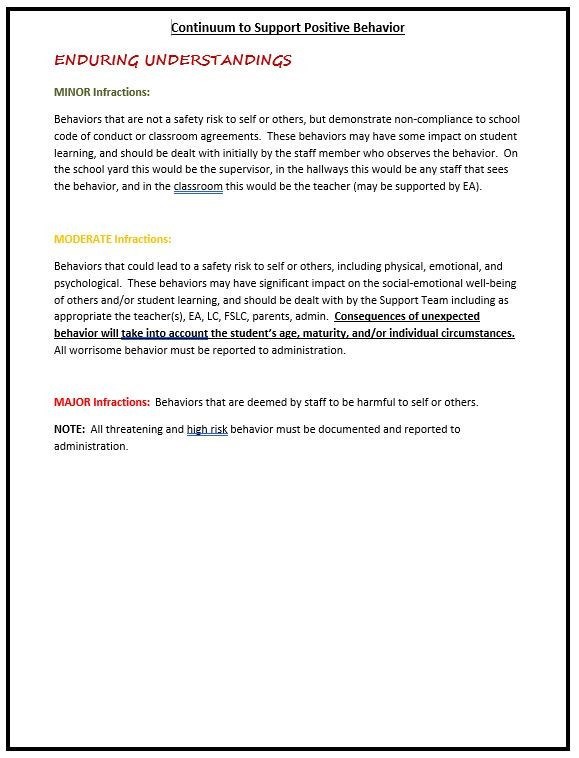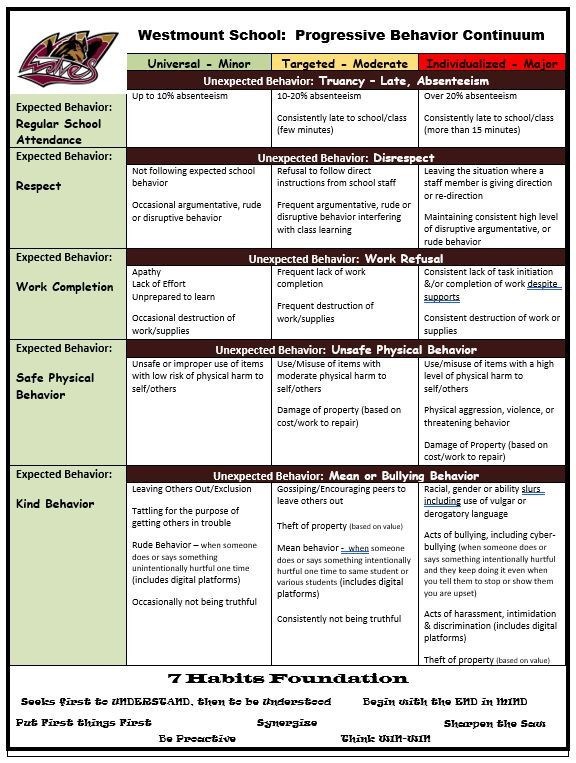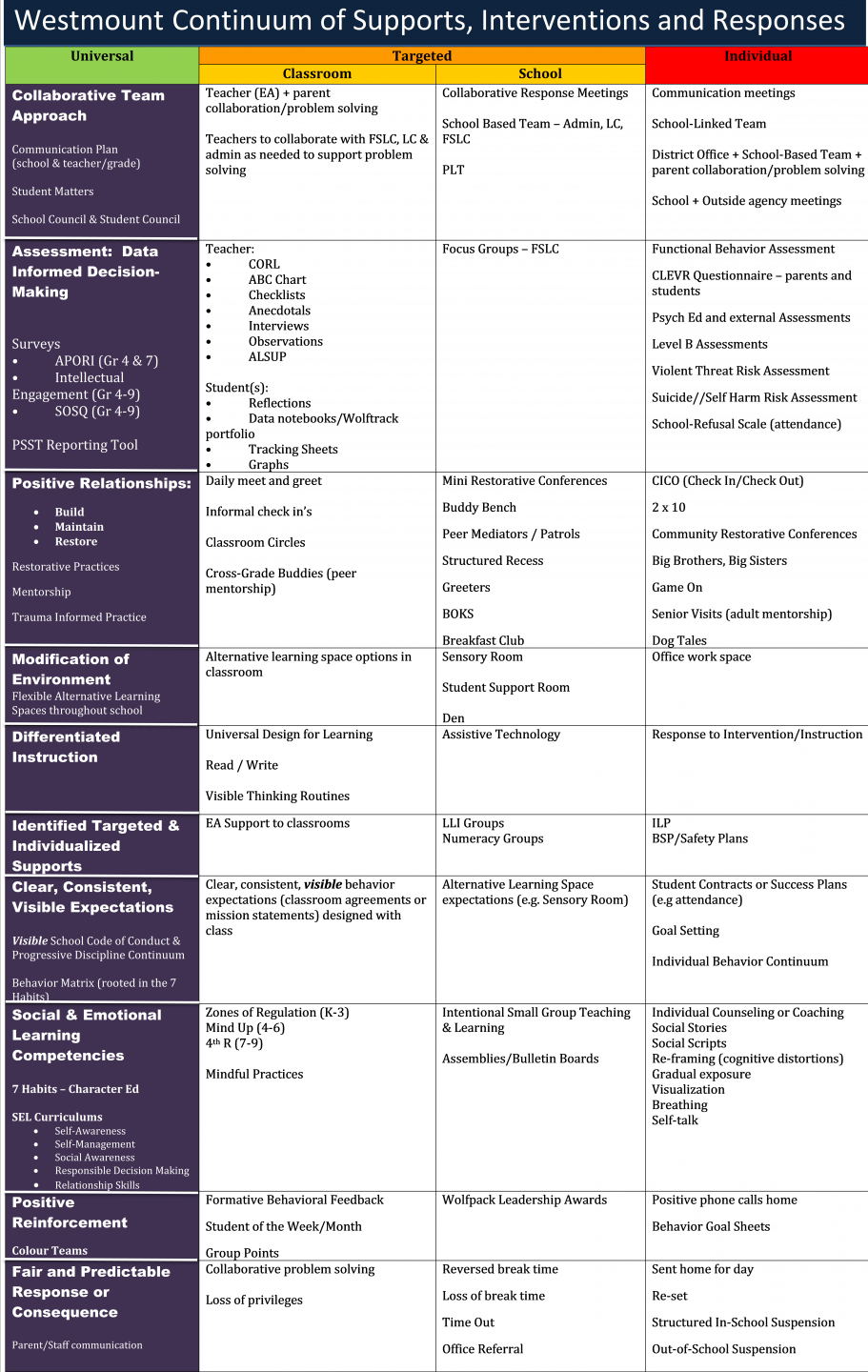Student Conduct and Discipline
Westmount School Protocols
.jpg)
Responsibilities of Students, Staff and Parents: The development of positive student behaviour is a shared responsibility between students, staff and parents. (Education Act, June 2020)
1. Students
A student, as a partner in education, has the responsibility to
- Attend school regularly and punctually,
- Be ready to learn and actively engage in and diligently pursue the student’s education,
- Ensure that the student’s conduct contributes to a welcoming, caring, respectful and safe learning environment that respect diversity and fosters a sense of belonging,
- Respect the rights of others in the school,
- Refrain from, report and not tolerate bullying or bullying behavior directed toward others in the school, whether or not it occurs within the school building, during the school day or by electronic means,
- Comply with the rules of the school and the policies of the board,
- Co-operate with everyone authorized by the board to provide education provide education programs and other services,
- Be accountable to the student’s teachers and other school staff for the student’s conduct, and Positively contribute to the student’s school and community.
Students are expected to conduct themselves in accordance with the School Student Code of Conduct developed by school leadership, staff, students and community.
Examples of (but not limited to) acceptable behaviour for students include:
1.1 Be ready to learn, and actively engage in, and diligently pursue your education;
1.2 Attend school regularly and punctually
1.3 Cooperate with all school staff;
1.4 Know and comply with the rules of Westmount school
1.5 Respect yourself and the rights of others in the school by demonstrating appreciation of diversity of all school members regardless of their race, religious beliefs, colour, gender, gender identity, physical disability, mental disability, age, ancestry, place of origin, marital status, source of income, family status or sexual orientation of that person or class of persons;
1.6 Ensure your conduct contributes to a welcoming, caring, respectful inclusive and safe learning environment that fosters a sense of belonging of others in your school;
1.7 Refrain from, report and discourage bullying or bullying behaviour directed toward others in the school, whether or not it occurs within the school building, during the school day or by electronic means;
1.8 Inform an adult you trust in a timely manner of incidents of bullying, harassment, intimidation or other safety concerns in the school;
1.9 Always demonstrate behaviors that positively contribute to and honour your school and community
Consequences must consider the student’s age, maturity, and individual circumstances rather than a “zero tolerance” approach to behaviour with a “one size fits all” approach to consequences, which is not consistent with the Education Act. The specific circumstances of the situation and of the student must be considered when determining appropriate consequences; for example, consideration of needs including physical, behavioural, communicational, cognitive, mental health, trauma, as well as student’s age, history, past interventions trialed, and accommodations/supports must be considered.
Examples of unacceptable behaviour may include:
1.1 Behaviours that interfere with the learning of others and/or the school environment or that create unsafe conditions;
1.2 Acts of bullying, harassment, or intimidation/discrimination;
1.3 Acts of violence, physical aggression or threatening behavior;
1.4 Retribution against any person in the school who has intervened to prevent or report bullying, harassment, or stop an incident that might cause harm to others;
1.5 Illegal activity such as: possession or use of weapons; possession or use of alcohol, drugs or other forms of intoxicants on school property or at any other school related function (i.e. graduation, field trips);
1.6 Theft or damage of property.
Westmount School uses a Progressive Discipline Continuum as noted below including such evidence-based practices as mentoring, restorative processes, student advisories, peer support networks, regular check-ins with teachers or school counsellors, counselling, time-out, suspension and/or expulsion. Support will be provided to students impacted by inappropriate behaviour and to those students who engage in inappropriate behaviour. Westmount school also has students who participate in extracurricular activities that agree to our student in good standing commitments.
2. Staff: Supports, Interventions and Consequences
A continuum of supports addresses how Westmount School creates a safe and caring environment and positive school climate in which structure, support and encouragement is provided to assist the student in understanding the importance of education, and developing a sense of self-discipline and responsibility while making a positive contribution to society. Westmount school will use proactive and preventative approaches to reduce the occurrence of unacceptable behaviour and maintain environments that are welcoming, caring, respectful, safe and are conducive to teaching and learning;
2.2 When responding to unacceptable behaviour, first consideration will be given to the safety and security of students, staff, and other members of the school community;
2.3 Students feel safe, important and trusted and have the opportunity to develop, assume and maintain responsibility and self-motivation;
2.4 There is a joint effort to learn and a feeling of mutual respect among staff, students and parents;
2.5 Appropriate behaviour is consistently encouraged and reinforced, thus increasing social emotional competencies including self-awareness, self-management, social awareness, relationship skills, and responsible decision-making;
2.6 On-going and timely communication exists between staff and parents to encourage and provide the opportunity for active and constructive parental involvement in the education of their children.
3. Parents
Parents are partners in respect to their child(ren)’s education. A parent has the prior right to choose the kind of education that shall be provided to the parent’s child, and as a partner in education, and as a partner in education has the responsibility to:
- Act as the primary guide and decision-maker with respect to the child’s education,
- Take an active role in the child’s educational success, including assisting the child in complying with section 31,
- Ensure that the child attends school regularly and is punctual,
- Ensure that the parent’s conduct contributes to a welcoming, caring, respectful and safe learning environment,
- Co-operate and collaborate with school staff to support the delivery of supports and services to the child,
- Encourage, foster and advance collaborative, positive and respectful relationships with teachers, principals, other school staff and professionals providing supports and services in the schools, and
- Engage in the child’s school community.
A continuum of supports addresses how Westmount School will support students impacted by inappropriate behavior and to those students who engage in inappropriate behavior. Support, not just punishment, will be provided to those students that engage in inappropriate behaviour as denoted by a Progressive Discipline Continuum including such evidence-based practices such as mentoring, restorative processes, student advisories, peer support networks, regular check-ins with teachers or school counsellors, counselling, time-out, suspension and/or expulsion.
Consequences of unacceptable behaviour will consider the student’s age, maturity and/ or individual circumstances. Support will be provided for any students who are impacted by inappropriate behaviour as well as for students who engage in inappropriate behaviour. Although the code of conduct will address issues such as consequences for unacceptable behaviour, the primary focus of the Student Code of Conduct is to help students learn how to address issues of dispute, develop empathy and become positive citizens both within and outside of the school community. Westmount School has a continuum of supports to ensure this.



Definitions
Respect: To show regard or consideration for others.
Harassment: Any behavior that in effect or intent disparages, humiliates, or harms another person or class of persons. It is behaviour that denies dignity and respect, and is demeaning and/or humiliating to another person or class of persons. Harassment may include, but is not limited to, references related to age, national or ethnic origin, religion, gender, sexual orientation, disability, race and/or sources of income or family status. Sexual harassment is any unwelcome behavior that is sexual in nature. Such behavior may directly or indirectly affect or threaten to affect in an adverse manner a student’s well-being and/or learning environment. The behavior does not need to be intended as harassing to be considered as personal harassment. It is sufficient that one knows, or ought reasonably to know, that his/her behaviour is offensive and unwelcome. Harassment is not a relationship of mutual consent. It is any action including, but not limited to verbal, physical, written and cyber messaging that is unwelcome or intimidating and denies individual dignity and respect.
Discrimination: The denial of individual rights and freedoms in a manner, which contravenes the Canadian Charter of Rights and Freedoms and/or the Alberta Human Rights Act (AHRA). Discrimination on the basis of race, religious beliefs, colour, gender, physical disability, mental disability, age, ancestry, place of origin, marital status, source of income, family status, creed, sexual orientation, and citizenship is prohibited.
Bullying: Bullying means repeated and hostile or demeaning behaviour by an individual in the school community where the behavior is intended to cause harm, fear or distress to one or more individuals in the school community, including psychological harm or harm to a person's reputation. It often involves an imbalance of social or physical power.
Bullying behaviours are a form of aggression and can be:
- Physical – For example: poking, elbowing, hitting
- Verbal – For example: name calling, insults, racist, sexist or homophobic comments, put-downs or threat
- Social – For example: gossiping, spreading rumours, excluding someone from the group, isolating, ganging up
- Cyber – For example: social or verbal bullying through the use of email, text messages or social media including the sharing of intimate images.
Progressive Discipline: In a whole school approach that utilizes a continuum of prevention programs, interventions, supports, and consequences to address inappropriate student behavior and to build upon strategies that promote and foster positive behavior. When inappropriate behavior occurs, disciplinary measures should be applied within a framework that shifts the focus from one that is solely punitive to one that is both corrective and supportive.
